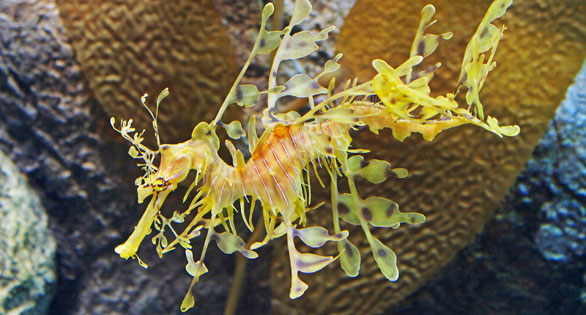
Leafy Sea Dragon photographed at the Monterey Bay Aquarium. Image by Joseph C. Boone/Creative Commons.
Ocean Rider, based in Kailua-Kona, Hawaii, is well known in the sygnathid community for their commercial propagation efforts with seahorses. What might not be as widely known is the research and development work being done with the related sea dragons, specifically the Leafy Sea Dragon, Phycodurus eques. Reports of successful captive breeding for the related Weedy Sea Dragon, Phyllopteryx taeniolatus, are rare but documented.
Meanwhile, the Leafy Sea Dragon apparently has never been successfully spawned and reared in captivity, this despite rumors to the contrary that we’ve been unable to prove (see our own recantation of this species from our 2013 Captive Bred List). Ocean Rider has been working with this species, one known to be difficult to maintain in captivity, and cites their unique resources as cause for optimism in the culture of the species.
“We believe that we’ll have baby dragons soon” states Ocean Rider’s Carol Schmarr in the above video from February, 2012. She goes on to explain her prediction based on having “a nice, natural, open air photoperiod. There’s no noise around here. The animals get to eat those delicious red shrimp [Halocaridina rubra] coming out of our shrimp pond which are full of long chain fatty acids which are essential to reproduction in seahorses. They have that clean, cold water that always runs through the system; we don’t recirculate the water, so you know they’re really happy. It’s a really good place for these dragons.”
Schmarr and Ocean Rider has since joined the ranks of those “coming close”, publishing video of mating behavior as well as egg production, within their Hawaiian facility as of March & April 2013.
As reported on Facebook: “Mar 26, 2013 4:59pm: Exciting news on the farm! Our leafy Seadragons are displaying mating behaviors. The female is swollen with eggs and keeps following the male in attempts to lay them on his brooding patch. We see them going to the surface, swimming side by side in a courting dance. Here’s a quick clip!”
Following up on April 6th, Ocean Rider updated their audience, announcing “This time we observered the female seadragon laying eggs in three separate attempts over the course of 24 hours. 2 attempts were found on the bottom of the tank and 1 attempt stuck to the side of the tank. They were close, but no baby Seadragons this time around.” The folks at Ocean Rider are obviously excited, sharing, “This marks the 6th time we have seen eggs produced on the farm and the very first time we have witnessed the male willing to receive them!”
Some in seahorse breeding community would like Ocean Rider to be more open about their breeding efforts, and this is actually a matter of company policy. As disclosed on their website, “Ocean Rider does NOT disclose its breeding technology , grow-out technology, or species names of their famous sea horses for proprietary reasons.”
Perhaps these recent videos are a sign of relaxing this policy. The entire public aquarium and academic sphere has been chipping away at the husbandry and breeding of sea dragons for some time, and no doubt their published successes and failures have helped provide insights to the team at Ocean Rider. There is a complex mix of interests involved in this challenge, from private business to public institutions to small-scale would-be breeders, and the tendency to control the release of new findings is seen in all groups. If nothing else, we can’t wait to see the first captive-bred Leafy Sea Dragons, whoever accomplishes this feat first! Looks like Ocean Rider is definitely in the running.
Sources:
Ocean Rider on YouTube (Mating Sea Dragons Videos)
Wikipedia: Leafy Seadragon
Ocean Rider Seahorses (Ocean Rider, Inc.)
Ocean Rider on Facebook


Trackbacks/Pingbacks